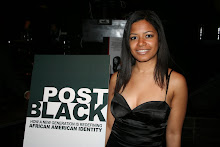
Africa is such an expansive continent, with hundreds of cultures, languages and subgroups, that it's a little off putting when someone lumps them all in one.
While oversimplification might make for digestable nostalgia about black history and the world, we miss the incredible cultural lessons, the richness in diversity, and the essence of the people themselves when we resort to such ridiculous limitations.
So I've made it a mission of mine, to go beyond the do good rhetoric of those who claim they're blanketly raising money for Africa, or this school will be built in Africa, or this necklace was made in Africa, and asking for some details. "Where in Africa?" What ethnic group?" "What does this mean?" and so on.
The other day, I stopped by an African jewelry shop in Washington D.C's Adams Morgan. I surveyed the counter and was captivated by a large silver onkh-like pendant, boxed in triangles on a necklace. It had decorative etchings, and was very ethereal and old world. So I asked the owner about it.
He said it was made by the Tuareg people of Mali. The Tuareg also know as the Blue People because of their indigo rich clothing, are a Berber ethnic group. The Berbers were a nomadic culture known for their artisanship and business savvy, and credited for the sophisticated trading systems across the Sahara and in the Mediterranean hundreds of years ago. The Tuaregs primarily reside in West and North Africa.
The piece in question was the Cross of Agadez, a Tuareg version of the Egyptian anhk, meaning it expressed life, the balance between male and feminine energy in creation. As for the triangle shapes that bound it, they symbolized the four corners of the world. "When a child grows up and decides to go out on their own, the parents give this to them," the shop owner said. "It's a reminder that no matter where they go, or what corner of the earth they travel to, they should always be kind to people. They should treat others the way they want to be treated."
What a nice bit of wisdom to send someone off with. As a people who've historically travelled to foreign lands, I thought it was also a very peaceful approach to life.
It made me wonder which came first, the biblical golden rule or the ankh inspired Tuareg Cross of Agadez?
The shop owner added that the Tuareg were also called "The Veiled People." The men were known for wearing ornate but heavy veils. While most assumed it was to protect them from the sandstorms of the Sahara, the shop owner said it symbolized something else. "They believe that the spoken word has so much power that its best to cover your mouth to prevent you from saying anything foul," he said. He also added that for the Tuereg people, it's fundamentally more important to cover your mouth than any other area of your body.
But the Tuaregs are one of thousands of cultures, many with old world roots who've accrued pearls of wisdom over the ages. While much of this wisdom probably influenced the philosophers or religions we know today, the cultures that gave rise to or were influenced by it are rarely discussed.
I didn't buy the cross. The guy was charging $120 for it. But I found some online for $20 bucks. Even a bit of wisdom can be found at a discount.










